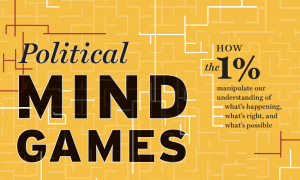Injustice: Are We Treated Fairly?

The pursuit of justice is among the most potent drivers of human action. Recognizing the injustices in our midst can be a relentless force for progressive change. That’s why today’s plutocrats, committed to preserving their wealth and power above all else, use psychological mind games to influence the public’s view of what’s fair and what’s not. Indeed, our sensitivity to injustice offers the 1% an attractive entryway for shaping our perceptions and advancing their own narrow agenda.
Whenever the predatory class succeeds at twisting our notions of what’s just—for example, by promoting corporate school reform, opposing raises for low-wage workers, defending racial profiling, or suppressing voter turnout—it’s a setback for achieving a more equal society. Unfortunately, their arguments often find a receptive audience. The public is eager to believe that those with great power are deeply concerned about the common good. The reality is quite different. The ploys of the 1% lead justice-seekers away from the truth or, at the very least, confuse them into a state of inaction. Toward these ends, the 1%’s well-tuned propaganda machine runs non-stop. With help from a mainstream media that’s sometimes spineless or complicit, their self-righteous tales as would-be defenders of justice gain broad dissemination.
In POLITICAL MIND GAMES: How the 1% Manipulate Our Understanding of What’s Happening, What’s Right, and What’s Possible, I take a close look at four of the injustice mind games that, regrettably, have proven effective at undermining the public’s stubborn yet imperfect commitment to justice: We’re Fighting Injustice, No Injustice Here, Change Is Unjust, and We’re the Victims.
**POLITICAL MIND GAMES is available through Amazon, Barnes & Noble, other online outlets, and neighborhood bookstores.**